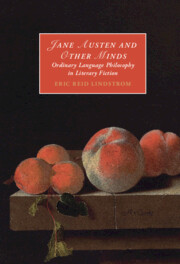Book contents
- Jane Austen and Other Minds
- Cambridge Studies in Romanticism
- Jane Austen and Other Minds
- Copyright page
- Contents
- Acknowledgments
- Abbreviations
- Introduction
- Chapter 1 Austen and Austin
- Chapter 2 Intelligible Community
- Chapter 3 Sense and Sensibility and Suffering
- Chapter 4 Pride and Prejudice and the Comedy of Perfectionism
- Chapter 5 Perlocutionary Entailments
- Chapter 6 Emma and Other Minds
- Chapter 7 Persuasion, Conviction, and Care Jane Austen’s Keeping
- Notes
- Bibliography
- Index
- Cambridge Studies in Romanticism
Chapter 3 - Sense and Sensibility and Suffering
Published online by Cambridge University Press: 04 November 2022
- Jane Austen and Other Minds
- Cambridge Studies in Romanticism
- Jane Austen and Other Minds
- Copyright page
- Contents
- Acknowledgments
- Abbreviations
- Introduction
- Chapter 1 Austen and Austin
- Chapter 2 Intelligible Community
- Chapter 3 Sense and Sensibility and Suffering
- Chapter 4 Pride and Prejudice and the Comedy of Perfectionism
- Chapter 5 Perlocutionary Entailments
- Chapter 6 Emma and Other Minds
- Chapter 7 Persuasion, Conviction, and Care Jane Austen’s Keeping
- Notes
- Bibliography
- Index
- Cambridge Studies in Romanticism
Summary
Chapter 3, “Sense and Sensibility and Suffering,” begins from the philosophical writings of Ludwig Wittgenstein on the problem of other minds. Wittgenstein, like Adam Smith, positions suffering and pain as the paradigmatic experiences in discussion of other minds. (Austin’s paradigmatic feeling is anger.) This chapter deploys a flattened point of view in terms of what it means to be “insensible,” particularly in relation to the non-human paper and ink fictional characters in an “early” Austen novel. It also provides close reading of Sense and Sensibility through a Cavellian exploration of the philosophical problems of skepticism and acknowledgment. Cavell presents his own reading of late Wittgenstein as one of an intimate frustration with the workings of criteria. Such an experience models a necessarily and potentially productive frustration that modern novel readers often report with the main character/trait pairings of Sense and Sensibility. The chapter promotes the interest of otherwise flat writing as modeling forms of resiliency. These critical practices are especially vital to reading Austen’s fiction before her great success in writing novels of inwardness.
Keywords
- Type
- Chapter
- Information
- Jane Austen and Other MindsOrdinary Language Philosophy in Literary Fiction, pp. 72 - 95Publisher: Cambridge University PressPrint publication year: 2022



